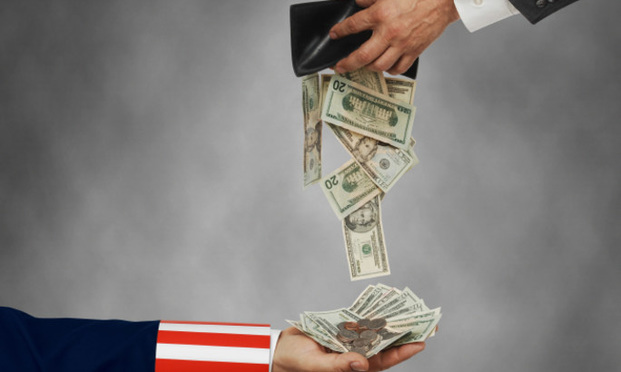$40M From Pharma Inventor's Licensing Contracts Is Taxable as Income, Not Capital Gain
Millions of dollars a pharmaceutical inventor received under a technology license agreement should be treated as ordinary income, rather than capital gains, for tax purposes, a split federal appeals panel has ruled.
March 26, 2018 at 04:21 PM
3 minute read
 Photo Credit: James Steidl
Photo Credit: James Steidl Millions of dollars a pharmaceutical inventor received under a technology license agreement should be treated as ordinary income, rather than capital gains, for tax purposes, a split federal appeals panel has ruled.
A divided three-judge panel of the U.S. Court of Appeals for the Third Circuit ruled Monday that Dr. Spiridon Spireas, who developed a “liquisolid” application of a successful blood pressure drug, could not claim the more favorable tax treatment because the licensing agreement at issue did not include a transfer of all property rights. The decision affirmed a ruling of the Tax Court that determined the $40 million Spireas received under the agreement was not eligible for capital gains treatment.
According to Third Circuit Judge Thomas Hardiman, who wrote the court's precedential decision, Spireas initially argued that he transferred all his property rights regarding the blood pressure medication felodipine after the drug was created in 2000. However, Hardiman said, on appeal Spireas contended that he transferred his rights in 1998 under a much broader licensing agreement with Mutual Pharmaceuticals to begin adapting “liquisolid” versions of medications.
Hardiman ultimately determined that, based on recent precedent regarding waiver, Spireas had abandoned any argument that he transferred his rights in the 1998 agreement, and further that Spireas could not have transferred the rights under the broader licensing agreement, because his concept of creating a liquisolid version of felodipine haven't yet moved into actual practice.
“Because that was at least two years before the invention of the felodipine formulation, Spireas' current position cannot depend on the legal standard for reduction to actual practice to establish that he held a property right at the time of transfer,” Hardiman said.
Judge Jane Roth said in a dissent that the majority misunderstood Spireas' argument by confusing the legal transfer of rights with the physical transfer of the specific felodipine formulation.
“Undoubtedly, Spireas' trial counsel could have used more precise language to distinguish between the legal transfer of rights and the physical transfer of the formulation,” Roth said. “But, under this court's precedents, that mistake alone provides an insufficient basis to find that Spireas has waived his argument on appeal.”
According to Hardiman, Spireas invented liquisolid technology, which is a formulation for medications that allows the body to absorb water-insoluble molecules. The technology, however, must be adapted for each individual medication, which requires a lot of testing and development, Hardiman said.
In 1998, Spireas entered into an agreement with Mutual Pharmaceuticals licensing the technology generally, and granting the company the rights to make and sell the specific products. In 2000, Spireas also entered into an engagement letter with Mutual to develop a liquisolid version of felodipine.
Over two years, Spireas earned $40 million under the agreement regarding felodipine. He paid 15 percent of that in taxes, claiming that it counted as capital gains. However, the Tax Court determined the money was ordinary income, and he owed 35 percent—which was $5.8 million more than he paid.
Bryan Killian of Morgan, Lewis & Bockius argued before the Third Circuit on behalf of Spireas, and Clint Carpenter argued for the U.S. Department of Justice. Killian declined to comment.
A spokeswoman with the DOJ declined to comment.
This content has been archived. It is available through our partners, LexisNexis® and Bloomberg Law.
To view this content, please continue to their sites.
Not a Lexis Subscriber?
Subscribe Now
Not a Bloomberg Law Subscriber?
Subscribe Now
NOT FOR REPRINT
© 2025 ALM Global, LLC, All Rights Reserved. Request academic re-use from www.copyright.com. All other uses, submit a request to [email protected]. For more information visit Asset & Logo Licensing.
You Might Like
View All
Pa. Superior Court Rules Pizza Chain Liable for Franchisee Driver's Crash
4 minute read
Pa. Defense Firm Sued by Client Over Ex-Eagles Player's $43.5M Med Mal Win
3 minute read

Trending Stories
- 1Landlord Must Pay Prevailing Tenants' $21K Attorney Fees in Commercial Lease Dispute, Appellate Court Rules
- 2Compliance with EU AI Act Lags Behind As First Provisions Take Effect
- 3NJ's Pardons and Commutations A Model for the Federal System
- 4As Political Retribution Intensifies, Look to Navalny's Lawyers
- 5Family Law Practitioners Weigh In on Court System's New Joint Divorce Program
Who Got The Work
J. Brugh Lower of Gibbons has entered an appearance for industrial equipment supplier Devco Corporation in a pending trademark infringement lawsuit. The suit, accusing the defendant of selling knock-off Graco products, was filed Dec. 18 in New Jersey District Court by Rivkin Radler on behalf of Graco Inc. and Graco Minnesota. The case, assigned to U.S. District Judge Zahid N. Quraishi, is 3:24-cv-11294, Graco Inc. et al v. Devco Corporation.
Who Got The Work
Rebecca Maller-Stein and Kent A. Yalowitz of Arnold & Porter Kaye Scholer have entered their appearances for Hanaco Venture Capital and its executives, Lior Prosor and David Frankel, in a pending securities lawsuit. The action, filed on Dec. 24 in New York Southern District Court by Zell, Aron & Co. on behalf of Goldeneye Advisors, accuses the defendants of negligently and fraudulently managing the plaintiff's $1 million investment. The case, assigned to U.S. District Judge Vernon S. Broderick, is 1:24-cv-09918, Goldeneye Advisors, LLC v. Hanaco Venture Capital, Ltd. et al.
Who Got The Work
Attorneys from A&O Shearman has stepped in as defense counsel for Toronto-Dominion Bank and other defendants in a pending securities class action. The suit, filed Dec. 11 in New York Southern District Court by Bleichmar Fonti & Auld, accuses the defendants of concealing the bank's 'pervasive' deficiencies in regards to its compliance with the Bank Secrecy Act and the quality of its anti-money laundering controls. The case, assigned to U.S. District Judge Arun Subramanian, is 1:24-cv-09445, Gonzalez v. The Toronto-Dominion Bank et al.
Who Got The Work
Crown Castle International, a Pennsylvania company providing shared communications infrastructure, has turned to Luke D. Wolf of Gordon Rees Scully Mansukhani to fend off a pending breach-of-contract lawsuit. The court action, filed Nov. 25 in Michigan Eastern District Court by Hooper Hathaway PC on behalf of The Town Residences LLC, accuses Crown Castle of failing to transfer approximately $30,000 in utility payments from T-Mobile in breach of a roof-top lease and assignment agreement. The case, assigned to U.S. District Judge Susan K. Declercq, is 2:24-cv-13131, The Town Residences LLC v. T-Mobile US, Inc. et al.
Who Got The Work
Wilfred P. Coronato and Daniel M. Schwartz of McCarter & English have stepped in as defense counsel to Electrolux Home Products Inc. in a pending product liability lawsuit. The court action, filed Nov. 26 in New York Eastern District Court by Poulos Lopiccolo PC and Nagel Rice LLP on behalf of David Stern, alleges that the defendant's refrigerators’ drawers and shelving repeatedly break and fall apart within months after purchase. The case, assigned to U.S. District Judge Joan M. Azrack, is 2:24-cv-08204, Stern v. Electrolux Home Products, Inc.
Featured Firms
Law Offices of Gary Martin Hays & Associates, P.C.
(470) 294-1674
Law Offices of Mark E. Salomone
(857) 444-6468
Smith & Hassler
(713) 739-1250





